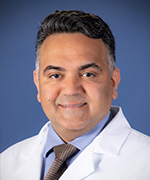Preparing for Surgery
Whether you are seeking surgery to relieve chronic symptoms or a comprehensive evaluation for new symptoms, we’re here for you. Our colorectal surgery team will help you navigate your treatment every step of the way.
UC Davis Colorectal Surgery: Your First Clinic Visit
Starting with your very first clinic visit, our goal is to learn as much as possible about the symptoms you are experiencing and how they are affecting your daily life. Doing so helps us develop a treatment plan based on your unique needs and medical preferences.
It is normal to be a little anxious about seeing a colorectal surgeon, but don't let this stop you from telling us what you are experiencing. We've dedicated our careers to helping patients get lasting relief from common and complex colorectal conditions. Our compassionate approach helps you get the best possible care.
Please bring the following information with you to your first clinic visit:
- All of the medications you are currently taking
- Copies of any imaging tests you have received for the colorectal condition
- A completed New Patient History Form (PDF)
- Download and print to fill out OR
- Save a copy to complete this form and email to crs@ucdavis.edu
Preparing for Colorectal Surgery
We offer an array of non-surgical treatments for colorectal conditions, including in-office procedures and diet recommendations to help boost your fiber intake. However, surgery is sometimes the best option.
Your comfort and peace of mind are important to us. If we recommend surgery, we take time to discuss the procedure that is best for you and how it will help you feel better. We are always happy to answer any questions you may have. We give you all the information you need before surgery day, which can help you achieve the best possible results.
Here's what you may expect when preparing for your procedure:
- Stopping or starting certain medications: You may need to stop taking certain medications, including blood thinners, in the days leading up to your procedure. To help ensure your bowels are empty on the day of surgery, you take special medication that causes bowel-clearing diarrhea. The medication may cause waves of unpleasant sensations, but you will not feel pain.
- Restricting food and drink: You will not be able to eat anything after midnight on the evening before your surgery. However, you may be able to consume a special drink that helps stay hydrated prior to surgery.
- Finding caregiver support: You should arrange to have extra help at home in the days after your procedure. You may feel sore or be too tired to follow post-surgery care instructions on your own.
- Reviewing the surgical plan: On the day of surgery, you meet with members of our team to go over last minute preparations, such as marking the surgical site or planning the medications you will receive during surgery. This is also an opportunity for you and your family to ask us any last minute questions.
What to Expect After Colorectal Surgery
At UC Davis, we practice the Enhanced Recovery After Surgery process before surgery and during your hospital stay. Our approach to care makes recovery from colorectal surgery safer, faster and more efficient by:
- Controlling pain using safe and appropriate levels of medication
- Helping you eat and get moving earlier in the recovery process, which prevents complications
- Giving you access to your medical team any time you have questions or concerns
- Ensuring a smooth transition home by identifying additional needs, such as physical therapy or support services, and having a plan in place to meet them
Once you return home, our dedicated clinical nurse specialists and an advanced practice nurse are available to answer your health questions and help restore your colon health.
Our specialists help you with:
- Diet and nutrition: Following surgery, you may need a special diet that is easy on your colon. We answer questions about the foods you should be eating and let you know when it is safe to transition back to a more normal diet.
- New bowel habits: Your bowel habits, including frequency, consistency and predictability may change after surgery. Some of these changes are temporary and others are permanent. We help you cope and find ways to prevent accidents.
- Ostomy and stoma care: If your colon is no longer functioning or needs time to rest and heal, your surgery may include creating an opening (stoma) at the end of your digestive tract. A stoma allows waste to bypass the colon where it collects into a special bag (ostomy bag) outside your body. We help you take care of your stoma and prevent infections. We also help you learn how to use ostomy products and who to call if you need more.

